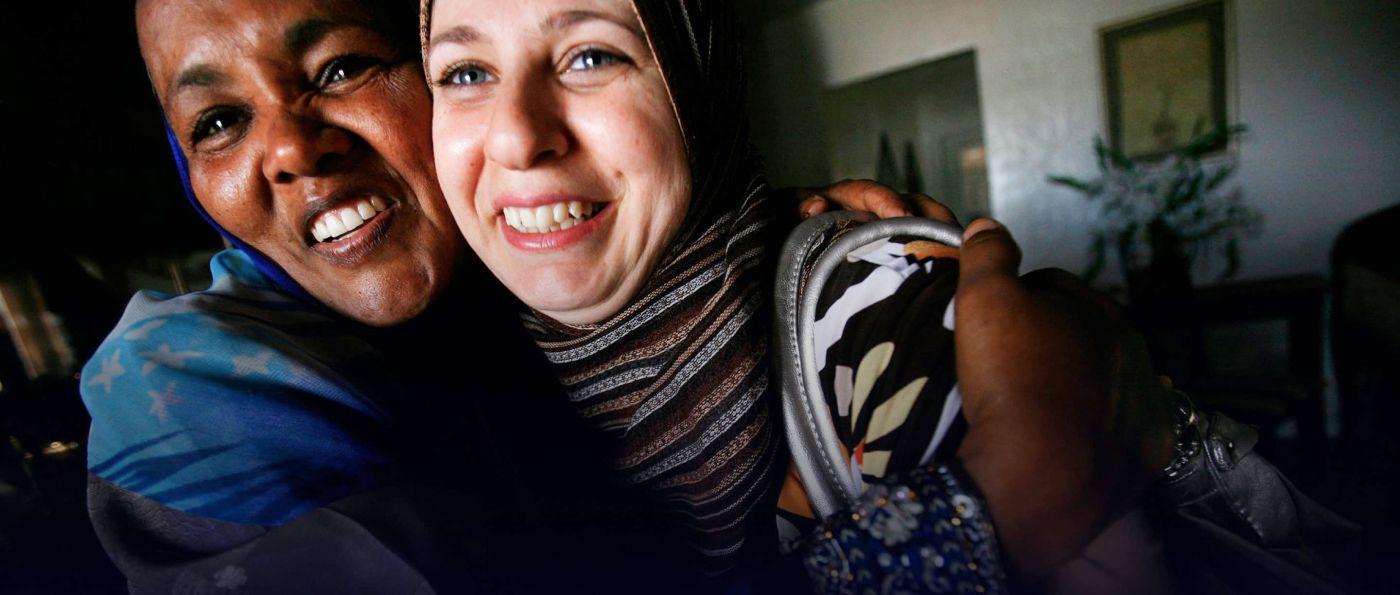WASHINGTON, D.C.—Over the past three years, Americans in all 50 states and 12,000 zip codes have stepped up to sponsor refugees through sponsorship programs authorized by the U.S. government (the Processes for Cubans, Haitians, Nicaraguans, and Venezuelans, Uniting for Ukraine, Operation Allies Welcome, and the Welcome Corps), helping newcomers rebuild their lives through safe, legal, and orderly pathways. Now, as the Trump Administration moves to not only end these programs, but threatens to terminate the legal status of sponsored individuals with humanitarian parole already in the country, American sponsors are speaking out about how these common-sense programs have transformed lives and communities and are pushing for a solution that allows these sponsored newcomers with active parole status to continue to live safely and contribute to the United States.
In letters to the editor and interviews, American sponsors are sharing their personal experiences with sponsorship and how these programs have strengthened their local communities by addressing depopulation in small towns, stimulating local businesses by filling jobs in critical industries facing labor shortages, and generating deep community engagement and new friendships across cultural divides.
Angela Boelens (DeWitt, Iowa) in The Quad-City Times: DeWitt nonprofit 'cautiously optimistic' in efforts to unfreeze Ukrainian program
“Our folks all get here and become financially independent quickly, and they’re filling great jobs, buying houses, cars, paying taxes, etc.,” Boelens said. “So, this is the right kind of program, and I think we have bipartisan, unilateral support for it. It’s just a matter of us making sure that our lawmakers are actively working with the current administration to make sure that these programs continue while not necessarily disrupting the work that they’re trying to do in solving the situation at the border.”
Brian Diebold (Windcrest, Texas) in The San Antonio Express-News: Pause on refugee admissions program hurts fleeing families — and ourselves
“For the past year, our congregation has been working to sponsor a family through the Welcome Corps, a program of the U.S. Refugee Admissions Program. Through the Welcome Corps, individual groups or organizations in the United States can sponsor the resettlement of a refugee and commit to being their community of support upon arrival. [...] “The relationships are a two-way street. They have shaped who we are, and we are better for their presence in our lives. [...] The issue of refugee welcome is very much a local issue and a matter of who we are as a people.
“Refugees are not a threat and are often the most vulnerable among us, having been forced to flee from violence or persecution and to leave behind all they have known at a moment’s notice. They are not coming to ‘take over’ or do harm but are simply human beings looking for a home in which to rebuild their lives.”
Elizabeth Langland (St. Augustine, Florida) in The Florida Times-Union: Don't close off refugee sponsorship
“We helped them secure housing, work permits, jobs and English lessons. In return, they enriched our lives, strengthening our ties to friends, neighbors and a new culture. We still celebrate birthdays and holidays together and both families are thriving in St. Augustine.
“Sponsorship profoundly changes the lives of both the sponsors and the families they welcome. When we close these pathways, we turn away from our core values and deny ourselves the contributions these newcomers bring.
“America should be expanding, not eliminating, programs that uphold ideals we have always held as a country — the right to freedom and security for all who seek it through the legal pathways we create.”
Bill Bewick (Richland Center, Wisconsin) in The New York Times: Re “Trump Officials Target Migrants Biden Allowed In”
“Welcoming vulnerable, fully vetted families through legal pathways should not be a divisive issue. It provides refuge to people who are eager to rebuild their lives and contribute to our society.
“Deporting people who are currently here with legal status under humanitarian parole not only puts the family I sponsored in jeopardy, but all those threatened by authoritarianism, conflict and extreme poverty, from the Western Hemisphere to Ukraine and Afghanistan.”
Angela Boelens (DeWitt, Iowa) in The Chicago Tribune: Is America turning its back on people most in need of our help?
“Having personally sponsored several refugee families in my eastern Iowa community, I am deeply concerned that we’re turning our backs on not only those who need our help most, but also the very ideals that define us as Americans. [...]
“Sponsorship not only helps vulnerable people in a time of great need, but it also unites communities around a common purpose. Humanitarian parole programs provide refugees with a legal path to the U.S. after thorough vetting — offering a bipartisan solution that also helps address depopulation in states like mine.
“But with the recent executive orders, the future of these life-changing programs is far from certain. My experience shows that our country can — and should — continue to support newcomers and reaffirm our shared values of freedom, compassion and opportunity that have made America great.”
Sponsors from South Carolina and Wisconsin in Forbes: Immigrant Humanitarian Parole Ending Opposed By Community Leaders
“Curtis Lee, a U.S. military veteran from Hartsville, South Carolina, who has personally helped Afghan migrants resettle in the U.S., argued that sponsorship programs represent the ideal model for immigration reform. He stated unequivocally, “Sponsorship programs are exactly the way to go.” [...]
“Sandra McAnany of La Crosse, Wisconsin, a sponsor for families through the humanitarian parole process, highlighted the rigorous vetting process immigrants undergo before arriving. “Each immigrant is vetted, medically examined, vaccinated, and has paid their own way to come to the USA,” she said. “They have found jobs, paid taxes, contributed to their communities, and pursued their dreams alongside Americans.”
Mitch Gittler (Vienna, Virginia) in Spectrum News 1: Trump ends Biden-era parole program, prompting fear among immigrants
“Mitch Gittler, a business owner in Virginia, sponsored immigrants under parole because he said he wanted to help people escape poverty and some of the problems from these countries.
“‘Terminating after all the time and money we’ve spent setting them up and acclimating them to the United States is very difficult. It’s a nightmare. It doesn’t make any sense. They’re helping our economy tremendously,’ Gittler said.
“‘I’m hoping that the states are going to start lawsuits, and some of the cities will start lawsuits preventing the government from deporting any of the people on parole or refugee program, because there’s enough other people that they need to prioritize,’” Gittler continued.”
Religion News Service: Surviving war, Afghan families are now caught in the crosshairs of refugee restrictions
“In 2022 my Afghan friend Karima, reeling from the death of her husband, told me she just wanted to resettle somewhere safe with good schools for her little boys. I suggested my hometown. She did her own research and decided that this was the place for her.
“More than two years later she works as a preschool teacher, her sons flourish in school, and her home is a hub of social life, including people from the church group that sponsored her. It’s because the experience has been so rewarding that these East Tennesseans are ready to welcome a new family.
“But they can only provide safety for the judge’s family if President Trump will provide Afghans with an exception to his suspension of the refugee program. If he honors Afghan allies’ loyalty, our Afghan allies will remember. And they will bring honor to his name, just as my Afghan friends want to do for me when they finally arrive to make my dear Appalachian hometown their new American hometown.”
Krista Kartson in Christianity Today: Can Christians Save the Refugee Program?
“Krista Kartson, the granddaughter of Ukrainian refugees, first saw the refugee crisis from overseas, with the Peace Corps in Ukraine and later with Samaritan’s Purse in Iraq. She saw communities burned to the ground in northern Iraq and heard from Christians and Yezidis who feared ISIS’s return to what was once their home.
“‘That really cemented in me the understanding that some people can return home and some simply can’t,” said Kartson, senior director for sponsorship initiatives with Welcome.US, which was formed as the US withdrew from Afghanistan.
She and her mother sponsored a Ukrainian mother and daughter so they could come to the US after the Russian invasion, and last year, she volunteered again to help another refugee family.’”
About Welcome.US
Welcome.US is a national initiative built to inspire, mobilize, and empower Americans and American institutions from all corners of the country to welcome and support those seeking refuge here. By unleashing the power of our civil society, the compassion of the American people, and innovations in the private sector, we have transformed our national resettlement system. Americans in 12,000 zip codes and across all 50 states have raised their hands to welcome newcomers through safe, legal, and orderly pathways—providing support to newcomers and our communities to thrive together and strengthen local economies.
To learn more about Welcome.US, please visit Welcome.US.

